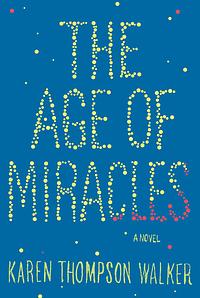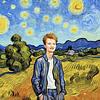Take a photo of a barcode or cover
What an amazing first novel. I loved the premise of the novel - that the rotation of the earth has slowed making days and nights get longer and longer - and how the author used this as a backdrop for a beautiful piece of character development. Walker has an amazing way with words, and I will definitely read future books by Walker.
So beautifully written and lyrical and just gorgeous. It's on the dystopian spectrum, but it doesn't have the same "feel" that so many of those books have. It was more like a report on real life, with just one tinge of weirdness. It felt believable and not too far from reality, I guess. But either way, there are so many phrases that just linger in my head, so many great ideas. SO worth reading.
I think I would have given this book 3.5 stars if I could. I loved the main character and the goings-on of her life. However, the entire premise of this book freaked me out just a little bit. Ha!
A really interesting premise for a book - & one that seems just possible enough to be truly frightening. This wasn't the best book I've ever read (for one thing it was a little too slow) but it has stayed on my mind, in particular the claustrophobic feeling and quiet horror that the author evokes. Definitely worth reading.
This was a great book. The whole premise was intriguing and the writing style was excellent. It is a dystopian novel [something I love], but this time there weren't any, or not as much, of the commonly seen cliches that get used over and over again in populair dystopian novels. It is refreshing, honestly.
It was as if I was reading a contemporary story, or maybe a sci-fi without the obvious sci-fi elements (if that even makes sense), and yes it was awesome. It was great how all kinds of elements were brought up, like the environment, the economy, and the government. Also, it was interesting how a lot of the people had different reactions to the slowing. The characters felt like very real people, and their reactions, fears, and hopes seemed to really live in the pages.
I rated it four stars eventually, but I was considering to give it five. Why not five? Just a feeling after reading it to be honest.
I would highly recommend this book.
It was as if I was reading a contemporary story, or maybe a sci-fi without the obvious sci-fi elements (if that even makes sense), and yes it was awesome. It was great how all kinds of elements were brought up, like the environment, the economy, and the government. Also, it was interesting how a lot of the people had different reactions to the slowing. The characters felt like very real people, and their reactions, fears, and hopes seemed to really live in the pages.
I rated it four stars eventually, but I was considering to give it five. Why not five? Just a feeling after reading it to be honest.
I would highly recommend this book.
An enjoyable enough read, but not nearly as good as it should have been. There was so much potential here, and at the end it was an absolutely typical YA coming of age story that just happened to be set at the end of the world. In fact (and this is probably not far of the mark for a teenager) the protagonist is much more concerned with her loneliness and then her boyfriend than she is with the fact that everything and everyone is going to die. Initially I was intrigued by the angle that puberty is its own little apocalypse, and the two cataclysmic events - time slowing and middle school - paralleled each other. Then the author just dropped that and went to the blah blah blah bad things happen, love is magical and affirming that then lost, classmates are mean, storyline that you can find in Eleanor & Park, The Fault in our Stars, (both better written) and a million other YA books. What a shame. If the author had done even the slightest bit of work to learn something about the science of what would happen if the Earth's rotation was slowed and then had the people live through that rather than telling us that crops die when there are 48 hour nights and the electric grid can't handle the needs of a planet dependent on sunlamps to grow all food and otherwise live(duh!)this would have been an exponentially better book. I toyed with making this a 2 star, but this author writes pretty prose and I enjoyed reading it so a low 3 seems fair.
I love the concept of the this book. The writing was solid and the main character is compelling, but maybe not compelling enough for me to really like the book. For whatever reason, maybe not enough empathy for the main character, the story left me just a bit flat.
The book started slow, but as I continued to read I began to enjoy it. I wish there was more science contained in the book about why the earth's rotation was slowing, and also about some of the panic that surrounds some of the major events.
I rarely despise books, so I was extremely shocked when the Age of Miracles made me want to stab myself with a blunt knife.
The premise of the novel is based on the earth slowing its rotation, creating extremely long days of sunlight, and even longer nights. Most people revert to "clock time," where they elongate their days and sleep, based on a new timing schedule. Those who aren't believers of clock time, follow "real time." Real timers sleep based on the new day and night hours. They sleep while everyone else is waking and trying to work. Of course, clock timers and real timers fear each other and point fingers at the other.
A social distinction between the clock timers and real timers is a slightly familiar thread of inequality between classes. There are also those who follow social norms and those who don't.
Julia, the protagonist, a teenage girl who is struggling with her life, as her neurotic, negative, and spiteful mother spews her negativity on those around her. Neighbors, Julia, and her husband, (Julia's father) are the ones most likely hit by her inability to cope with change.
The slowing of the earth follows a slowing of relationships and finally cracks and fissures in people's lives. I hated this book from start to finish. While it's well written, it lacks hope for the future of the earth, and clearly portrays the inability of humans to tolerate change with devastating consequences. Save your money.
The premise of the novel is based on the earth slowing its rotation, creating extremely long days of sunlight, and even longer nights. Most people revert to "clock time," where they elongate their days and sleep, based on a new timing schedule. Those who aren't believers of clock time, follow "real time." Real timers sleep based on the new day and night hours. They sleep while everyone else is waking and trying to work. Of course, clock timers and real timers fear each other and point fingers at the other.
A social distinction between the clock timers and real timers is a slightly familiar thread of inequality between classes. There are also those who follow social norms and those who don't.
Julia, the protagonist, a teenage girl who is struggling with her life, as her neurotic, negative, and spiteful mother spews her negativity on those around her. Neighbors, Julia, and her husband, (Julia's father) are the ones most likely hit by her inability to cope with change.
The slowing of the earth follows a slowing of relationships and finally cracks and fissures in people's lives. I hated this book from start to finish. While it's well written, it lacks hope for the future of the earth, and clearly portrays the inability of humans to tolerate change with devastating consequences. Save your money.
This was an interesting book on an interesting premis that was enjoyable. I read it in a matter of hours.
That said, the plot was a little less well-defined than I'm used to. If you are expecting every chapter to end leaving you on the edge of a cliff, you may be dissappointed. The narrator wrote from a perspective that is meant for adults. There would be several things in this book I would have missed or not fully understood if I read this during my teen years.
That said, the plot was a little less well-defined than I'm used to. If you are expecting every chapter to end leaving you on the edge of a cliff, you may be dissappointed. The narrator wrote from a perspective that is meant for adults. There would be several things in this book I would have missed or not fully understood if I read this during my teen years.



